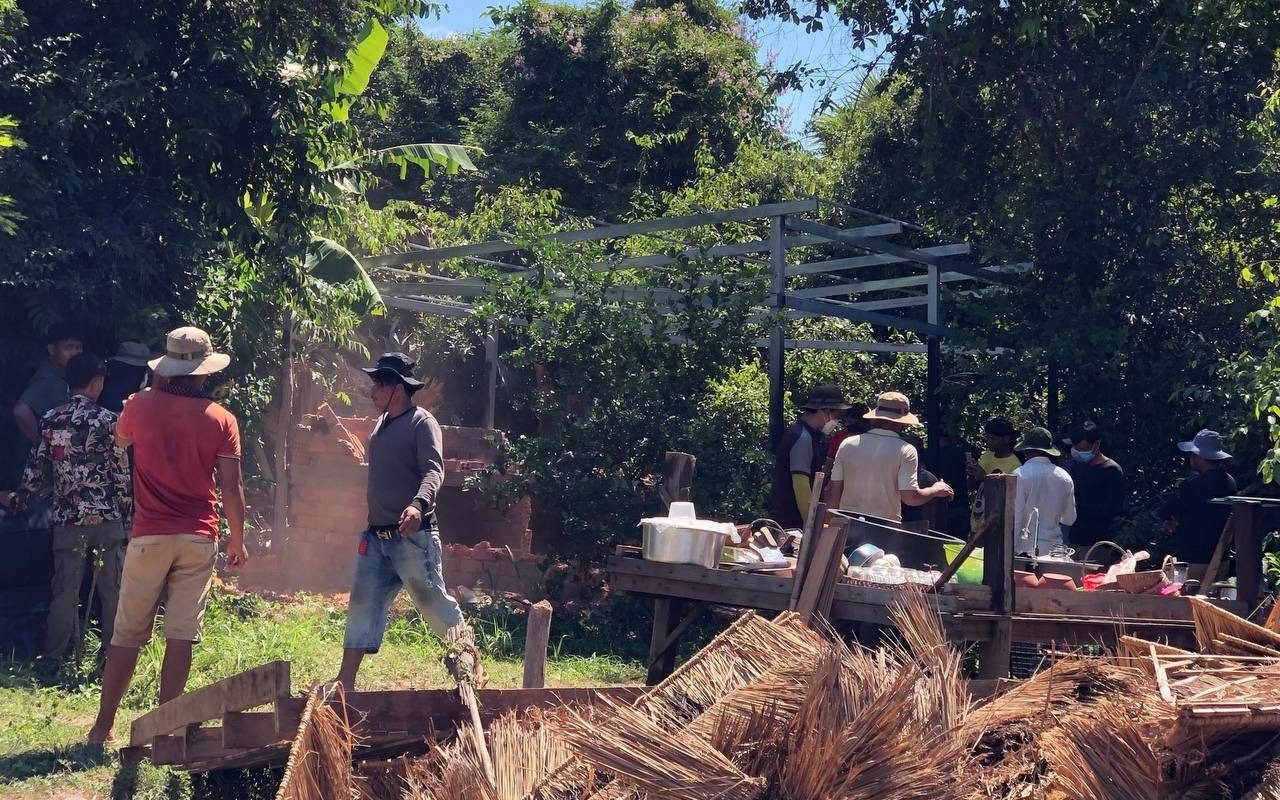The Apsara Authority in Siem Reap has continued demolitions of private structures in the Angkor temple park this week while providing land compensation for affected families in what appears to be a major new development area west of the city.
As the official campaign to remove shops, restaurants and homes from areas managed by Apsara continues, displaced families have in recent weeks participated in land lotteries for space in the Run Ta Ek Eco-Village, a site located about 23 kilometers northeast of Siem Reap city.
Once a settlement reportedly of less than 100 Khmer-style stilted homes, the area seems due for an expansion. The Ministry of Land Management, which is helping to oversee the removal of people and structures from Apsara areas, has posted on its Facebook page a set of map images showing a development plan for the site that more closely resembles a satellite city or borey community.
Officials are now resettling displaced families from Angkor park and elsewhere in Run Ta Ek, with plans to bring more people into the site in coming weeks.
The ministry posted on Tuesday that it is now measuring plots of land inhabited by private citizens in 79 of 114 target villages located in Apsara-controlled locations. The ministry stated that officials will compensate the users of 23,919 plots, while those who hold a further 19,449 plots will not be compensated.
The ministry has also said it prepared 819 spots in Run Ta Ek for compensation for people who voluntarily removed their structures in Apsara areas.
Though officials have asked residents to dismantle their own structures, many of the demolitions have been involuntary. Apsara officials say the campaign is part of preserving the beauty of the 400-square-km Angkor park, which Unesco has recognized as a world heritage site since 1992.
Prime Minister Hun Sen on Wednesday thanked those who voluntarily dismantled their structures near Angkor, saying the demolitions were important to maintain the temples’ status with Unesco.
“Thank you for leaving. If you did not not and still stayed illegally in the Angkor area, then Angkor Wat might be withdrawn from the world heritage [list], because it would lose the terms and conditions that are required by the world heritage commission.”
While the Angkor park is the largest of these Apsara-managed sites, other temple areas around the region are also overseen by the organization and will presumably be cleared of structures that officials say were illegally built.
Land Minister Chea Sophara said during an August 18 speech in Siem Reap that his ministry has counted 8,448 illegal constructions from 2019 until the middle of 2022. He called these “shaming buildings” and said their owners are responsible for demolishing them.
This week authorities took down structures they said were illegally built, including a dozen houses, at 20 locations around the Srah Srang reservoir in Angkor park.
A female resident who declined to give her name due to fears of repercussions told VOD she has lived in the area since her birth. The woman said she was shocked to find her shop stalls and a kitchen area demolished when she came home from work in Siem Reap city, adding that she had heard of the removal campaign in the news but had only been informed by authorities the day before they destroyed her property.
She said she won’t defy the authorities who removed her structures, as the area is well-known as a heritage site. She said she understands the official rationale to limit construction in the area, but claimed her house had stood on the site since her grandfather’s generation.
“We have a lot of memories here,” she said. “They should have told me.”
Now, she’s trying to find out if her adjacent house will be demolished next. She said officials came on Friday morning to discuss the prospect of land compensation in Run Ta Ek.
“I have asked the village chief to follow up about this, if my house will be impacted or not,” she said. “If we’re going to be impacted, we can’t do anything. If [the authorities] come calmly, we’ll all be calm.”
When contacted, Apsara spokesman Long Kosal said he was busy and did not answer questions from a reporter.
Additional reporting by Andrew Haffner













